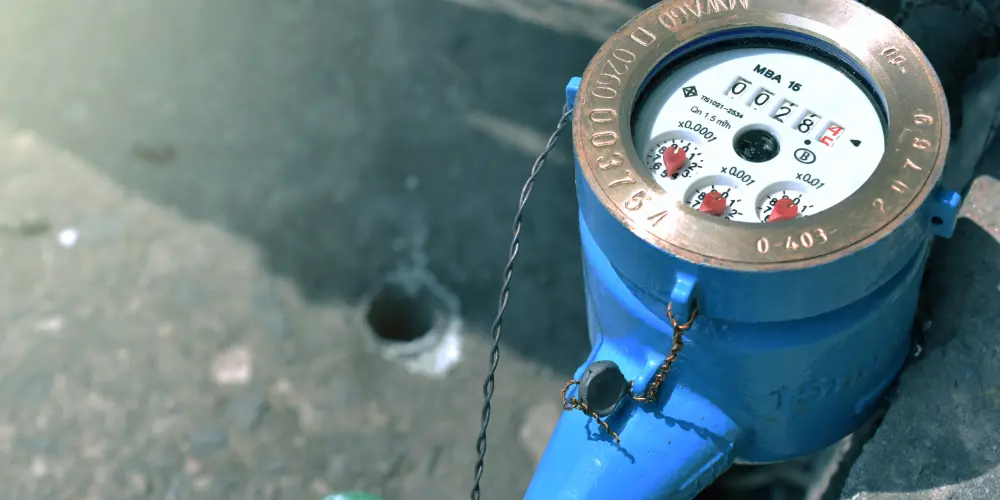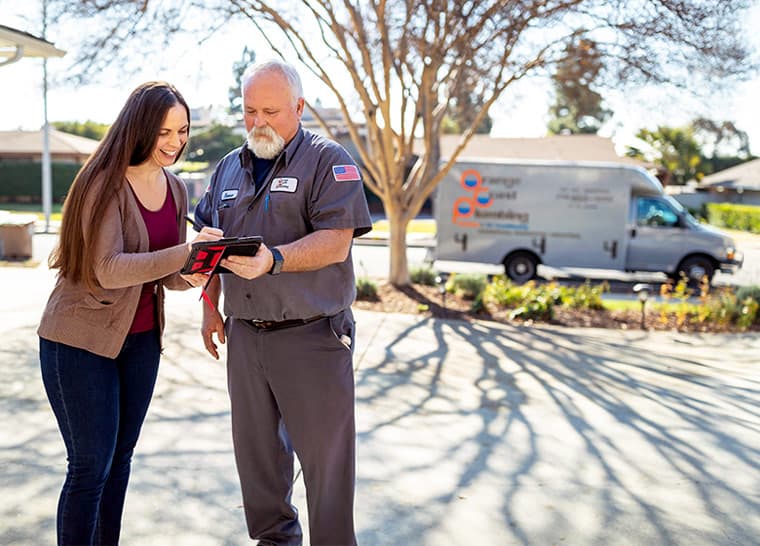Do you know your humble water meter is a secret weapon against leaks and water waste?
Unless you’re equipped with professional leak detection technology, like the good folks at Orange Coast Plumbing, you might want to keep an eye on it — not just to lower your bills, but to nip plumbing disasters in the bud.
Trust us, if you haven’t yet experienced the full glory of a slab leak in your living room, it’s something you want to avoid.
Why Check Your Water Meter?
Water scarcity is a growing concern worldwide. Conservation ensures adequate future resources and reduces the strain on water treatment facilities and ecosystems. Woo hoo! You’re a good citizen.
Two years of torrential rain have filled California’s reservoirs. However, California draws more than 15% of its surface water from the Colorado River and gets over 58% of the water from Lake Mead’s lower basin! These areas are well outside the local storm zone.
Look no further than recent drought years:
- 1986–1992
- 2006–2010
- 2011–2017
- 2020–2022
It’s clear that we can’t take water for granted. Unfortunately, many households waste it without even realizing it.
So do your part, check your meter, and plug those leaks to enjoy lower bills, good citizen vibes, and better security for your home.
What Water Meters Do & How They Work
Water meters measure the volume of water used in a residential or commercial space. They detect and record the water flow as it moves through the meter’s mechanism. All water meters operate on this basic principle despite their different types.
Types of Water Meters
- Mechanical Meters: These have a mechanical system of gears that move when water flows through them. Usually, a turbine or displacement device measures the volume.
- Digital Meters: Electronic digital meters provide more detailed and accurate readings. They often include easy-to-read LCD displays.
- Analog Meters: Analogs use a physical dial. They’re less common in modern installations, but remain viable because of their simple design and reliability.
- Ultrasonic Meters: These measure the velocity of water flow via ultrasonic sound waves to calculate the volume of water passing through.
- Smart Meters: A subcategory of digital meters, smart meters offer remote reading capabilities and advanced data analytics for more sophisticated water management systems.
Locating Your Water Meter
Your water meter is usually near your property’s curb or sidewalk, next to an outdoor faucet. It’s usually housed in a concrete box marked “water” or “meter.”
Check between two properties for a shared meter if you can’t see it from the street. You’ll need a long screwdriver or a small shovel. You might find it hidden under dirt, debris, or vegetation.
Knowing where your water meter is and how to reach it (and the shutoff valve) in an emergency is critical. Imagine a burst pipe in your home. How much damage can it do before the plumber arrives?
Make sure the area around your meter is clear and easily accessible.
How to Read Your Water Meter
To read your water meter for leaks, follow these steps:
- Shut Off All Water: Make sure no one is using water inside or outside your home. This includes faucets, hoses, washing machines, toilets, and irrigation systems.
- Record the Reading: Note the current reading on your water meter and write it down. If you have a traditional meter, remember the position of the sweep hand or note the reading on the odometer-style display. For digital meters, read the number on the LCD panel.
- Wait for 1-2 Hours: Wait for at least one to two hours. You could take a reading before commuting to work and again when you return home.
- Recheck the Reading: Revisit the meter and note the new reading. You may have a leak if the numbers have changed or the sweep hand has moved.
- Use the Leak Indicator: Some meters, particularly the newer models, have a leak indicator — a small triangle or wheel that spins when water flows through the meter. You probably have a leak if no water is running, but the indicator is moving.
- Monitor Regularly: Even small leaks can add up over time, so check your water meter regularly, especially after receiving a higher-than-usual water bill.
- Consider Environmental Factors: In frigid weather, pipes can expand and contract, which causes variations in the reading. Take this into account when checking for leaks.
- Consult with Utilities: If you suspect a leak but can’t locate it, contact your local water utility for assistance. They often provide leak detection services or guidance free of charge. Otherwise, it’s time to call a plumber.
Advanced Leak Detection Technologies
Water leak detection devices, like acoustic sensors and moisture meters, can pinpoint leaks within walls or underground pipes.
- Acoustic sensors can detect the sound of water movement even through layers of concrete or soil.
- Moisture meters can locate unusually high humidity levels long before more obvious symptoms manifest.
Specialists turn to industrial suppliers or companies specializing in plumbing and utility maintenance equipment.
Homeowners can find cheaper, consumer-friendly devices like smart water sensors at home improvement stores, electronic retailers, or online marketplaces.
Even better, an inline leak detection device can register even the tiniest pinhole leaks in your plumbing system and cut off the water supply before you experience a full-blown disaster. Many insurance companies will subsidize your purchase of this preventative technology or offer a discount on your premium.
Smart Leak Detection with Moen Flo
The best of the breed is the Moen Flo Smart Water Monitor & Shutoff. This smart water detector turns your home’s water supply off when it perceives a leak.
It measures gallon usage through an internal mechanical turbine or ultrasonic wave. After a week of learning, it can distinguish everyday water use from any suspect variation.
You can purchase a Moen Flo from Moen’s official website or online retailers like Amazon. Or if you live in Orange County, CA, or metro Los Angeles, from Orange Coast Plumbing.
How It Works
- The inline water leak detector is installed on the main water line for your house.
- It takes 7-10 days to understand your patterns of water use.
- The Wi-Fi-connected app gives you real-time alerts on your water use. You can set the water shut-off limit and configure settings for home and away water use.
- It also monitors water temperatures and alerts you when pipes are close to freezing.
Benefits of a Smart Leak Detector
- Automatic shutoff in case of leak, including slab leaks
- Lower insurance premiums
- Ability to control water flow from an app
- Insight into your daily water use
When There’s a Leak Before the Meter
Leaks in the main water supply often occur before the meter. Since the meter can only record the water that flows through it, any water loss before this point goes undetected by the meter.
The water utility company is responsible for identifying and repairing these leaks. Still, they can damage your property, so be aware of water pooling on the property or unusual soft, wet spots in the ground along the line of the main supply pipe. Call the utility company immediately if you notice these signs.
When There’s a Leak After the Meter
If the meter indicates water usage when all water fixtures are turned off, there may be a leak somewhere in your home. This could be due to any of the following:
- Faulty or worn-out plumbing fixtures, such as faucets, toilets, and shower heads.
- Damaged or deteriorating pipes.
- Leaking irrigation systems or outdoor faucets.
- Holes in the water line due to tree roots or shifting soil.
- Poorly sealed connections, especially where hoses and pipes join.
- High water pressure that stresses pipes and fixtures.
- Corrosion in older pipes can lead to small fissures and leaks.
- Shifts in the foundation of a house may break or loosen plumbing lines.
- Freezing and thawing cycles, which can burst pipes.
- Tree roots sometimes grow into the pipes and rupture them.
FAQs about Water Leaks
Q: What causes water leaks?
A: Aging pipes, corrosion, high water pressure, and improper installation or maintenance of plumbing fixtures are some of the factors that can cause leaks.
Q: How much water is wasted by leaks?
A: According to the Environmental Protection Agency (EPA), household leaks can waste more than 10,000 gallons of water each year, equivalent to the amount needed to wash 270 loads of laundry.
Q: Can I fix leaks myself?
A: Anyone with basic plumbing skills and tools can fix many minor leaks. Complex or hidden leaks usually require professional assistance.
Q: How often should I check for leaks?
A: We recommend checking for leaks at least once every season or more often if you live in an area with drastic temperature changes that can affect your pipes.
Q: What are the indications of a water leak in my home?
A: Common signs include the sound of running water when all taps are off, damp or discolored walls and ceilings, mold or mildew presence, a musty smell, unexpectedly high water bills, or a water meter that continues to run even when all water is turned off.
Q: How can I prevent leaks in my home?
A: Inspecting pipes for corrosion or damage, not putting undue stress on fixtures, insulating pipes against cold weather, and keeping your home’s water pressure at an appropriate level can significantly reduce the risk of leaks.
Q: Do leak detectors require professional installation?
A: Some leak detection systems, especially the “smart” ones, might require professional installation. However, simpler, passive leak detectors can typically be installed without professional help.
Q: How accurate are smart water leak detectors?
A: Very. Smart water leak detectors can detect even small drips of water. Their sensitivity varies, but many have customizable settings to reduce false alarms and can learn water use patterns in your home to provide more precise alerts.
Q: Does fixing leaks improve water pressure?
A: Fixing leaks can sometimes improve water pressure. However, if low water pressure persists, it may be due to other plumbing issues or the municipal water supply system.
Q: Can water leaks damage the foundation of a house?
A: Persistent leaks can lead to soil erosion or expansion underneath the foundation, leading to cracks and structural damage to your home.
Q: What should I do if I suspect a water leak outside my house?
A: Call a professional. These leaks can be challenging to locate and repair, and may require specialized equipment.


